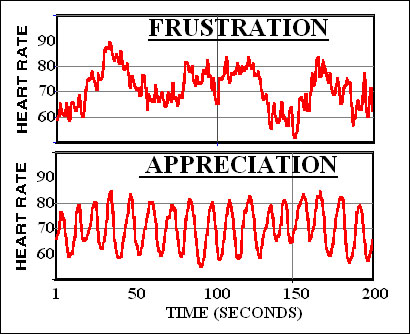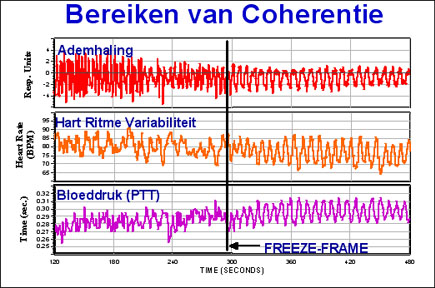Research
HeartMath's powerful outcomes and organizational benefits arose from more than 12 years of in-depth scientific research into the physiology of high performance, both for the individual and the organization. Our key discoveries include:
- High performance results from a balanced integration of mental, emotional and physiological factors.
- Emotional stress is the prime disabler of high performance. Stress reduction is key to increased health and performance, but relaxation alone is not enough.
- The heart is immediately affected by emotional change, and in turn, profoundly affects cognitive function, i.e., mental clarity, strategic thinking, decision-making, and communication skills.
- This heart-brain link can be managed by the individual, resulting in dramatic leaps in performance and productivity.

Figure 1: Perceptions and emotions profoundly affect Autonomic Nervous System balance and Heart.
Just as the mind/brain is an important information processing site, research indicates that the heart is one as well. In fact, the heart communicates with the brain and entire body in several ways—neurologically, biophysically, hormonally and energetically.
The heart is a highly complex, self-organized information processing center with its own functional "brain" that communicates with and influences the cranial brain via the nervous system, hormonal system and other pathways. These influences profoundly affect brain function and most of the body's major organs, and ultimately determine the quality of health, performance, and productivity.

Figure 2.
Research studies done at the Institute of HeartMath show that using HeartMath techniques can lead to physiological coherence, a state that manifests as more ordered and efficient function in the nervous, cardiovascular, hormonal and immune systems. Coherence involves a high degree of balance, harmony and synchronization within and between cognitive, emotional and physiological processes. Research has shown that this state is associated with high performance, reduced stress, increased emotional stability and numerous health benefits.
When we are more coherent we experience efficient and rewarding thoughts and feelings. Our ability to make efficient decisions, to think strategically, to innovate, to manage ourselves, to prioritize effectively, to communicate skillfully, to lead others, and to be more sensitive to the needs of others, are all enhanced. Our emotional intelligence is enhanced because we more easily experience feelings such as appreciation, care and compassion. Our perceptions encompass a wider view which, in turn, affects our actions and responses.
In the Benelux we facilitate research and a number of projects are ongoing. Below you can find a list of international studies on the use of Cardiac Coherence techniques from HeartMath:
Diabetes
Cardio Vascular Disease
A Controlled Pilot Study of Stress Management Training of Elderly Patients With Congestive Heart Failure
Lessons from Survivors: The Role of Recreation Therapy in Facilitating Spirituality and Well-Being
Bloodpressure
Maximizing Performance while Reducing Risk
Impact of workplace stress reduction on bloodpressure and emotional health in hypertensive employees
HeartMath and Hypertension, mini trial in Arabia, 2010
Depression & Stress
HeartRate Variability Biofeedback for major Depression
Education & cognitive function
The Garden of the Heart: HeartMath—The New Biotechnology For Treating Children with ADD/ADHD and Arrhythmia Improving Test-Taking Skills and Academic Performance in High School Students Using HeartMath Learning Enhancement Tools
The Role of the Heart in Learning and Intelligence
Early Childhood Development and Learning:What New Research on the Heart and Brain Tells Us about Our Youngest Children
The effect of HeartMath Techniques on Emotional Intelligence, 2005, Dissertation Sarah Ruth Hake
Emotions & HRV
The Psysiological and Psychological effects of Compassion and Anger
The Effects of Emotions on Short-Term Power Spectrum Analysis of Heart Rate Variability
The impact of a new Emotiona Self-Management Program on Stress, Emotions, Heart Rate Variability, DHEA and Cortisol
Organisational
Five Global Companies: Personal & Business Benefits of the Inner Quality Management® Program
The Effect of Employee Self-Management Training on Personal and Organizational Quality
Optimizing Performance in Times of Change
Improving the Bottom-Line
Cost Benefits with HeartMath®
Reformed church of America, analysis of HeartMath experience, nov 2009
Return on investment when implementing the HeartMath System
The Heart of Grinnel: a community wide rural health initiative, Alternative Therapies july/aug 2010
Police
Health, Performance and Resilience
Impact of the HeartMath Self-Management Skills Program on Physiological and Psychological Stress in Police Officers
The Investigation of Visual Attention and Workload by Experts and Novices in the Cockpit, 2013
Sports
Music
Implementatieonderzoek HeartMath Methode bij studenten van het Prins Claus Conservatorium, juni 2010
Music structure determines heart rate variability of singers, frontiers in psychology, July 2013
Intuition
For more information on the Research behind HeartMath we refer you to www.heartmath.org. Research has been publicated in The American Journal of Cardiology, Integrative Phsiological and Behavioral Science and Alternative Therapies. Also you can download a short summary of the Health Care Impact of HeartMath. In case you want to start a research please contact robert erdbrink from Heartmath Benelux.
The Award-Winning emWave® Desktop
A key factor in the effectiveness of HeartMath's programs is emWave® PC Stress Relief System technology, our patented, interactive learning system and heart rate variability monitor. Participants learn to use this innovative technology to monitor and change heart rhythm patterns, reducing stress and improving energy and overall health everyday. This technology has a dynamic, positive effect on stress levels, mental clarity, creativity and insight – all key factors in determining performance. The Freeze-Framer won TMC Labs' 2003 Innovation Award.
For an extensive overview of all research and casestudies please go to www.heartmath.org.